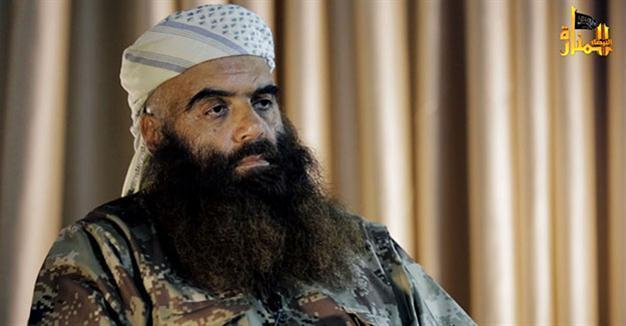Syria's Qaeda spokesman killed as army pushes anti-ISIL advance
BEIRUT - Agence France-Presse

An image grab taken from an undated video released via Al-Nusra's official channel Al-Manara Al-Baydaa shows Abu Firas al-Suri, the spokesman for Al-Nusra Front, giving an interview at an undisclosed location - AFP photo
Air strikes have killed several Al-Qaeda-linked Al-Nusra Front members including its spokesman and regime forces have retaken a strategic town from the Islamic State and the Levant (ISIL) group in the latest setbacks for jihadists in Syria.Abu Firas al-Suri, whose real name was Radwan Nammous, fought against Soviet forces in Afghanistan where he met Al-Qaeda leader Osama bin Laden and the founding father of global jihad, Abdullah Azzam, before returning to Syria in 2011.
Suri was meeting with other leading Islamist fighters in an Al-Nusra stronghold in Kafar Jales in northwestern Syria when the raids struck on April 3.
He "was an old time Al-Qaeda member ... He was brought in from Yemen as an ideological counterweight" for rival jihadist group ISIL, said Pieter Van Ostaeyen, a historian and monitor of jihadist groups.
"His death indeed is a blow for Al-Nusra. However, that will not change a lot on the operational level," he added.
According to the Syrian Observatory for Human Rights, Suri, his son and at least 20 jihadists of Al-Nusra and Jund al-Aqsa and other fighters from Uzbekistan were killed in strikes on positions in Idlib province.
Seven were high-ranking jihadists, the Britain-based Observatory said, adding that the Syrian air force had likely carried out the strikes.
A temporary ceasefire between government forces and rebels has largely held since February 27, but it does not cover Al-Nusra and ISIL.
The break has, in fact, allowed Russia and the US-led coalition that has been bombing ISIL in Syria to concentrate on their fight against the jihadists.
Al-Nusra has generally kept a low profile since the truce brokered by the United States and Russia came into force.
But on April 1, the Al-Qaeda affiliate and allied rebel groups pushed regime loyalists out of Al-Eis, a strategic town in the northern province of Aleppo, killing 12 members of the Lebanese Shiite Hezbollah movement.
"It was Al-Nusra's biggest operation since the ceasefire began," Observatory chief Rami Abdel Rahman said.
Suri's killing may even be a warning by the regime to Al-Nusra against staging any more offensives in future.
Al-Nusra's rival ISIL has also lost a string of high-ranking members in recent weeks, mainly to strikes by the US-led coalition that launched an aerial campaign against the jihadists in Iraq and Syria in 2014.
On March 30, a drone strike near IS's de facto capital Raqa killed Tunisian commander Abu al-Haija, according to the Observatory.
Fifteen ISIL commanders accused of revealing his position have since been executed by the jihadists, and the fate of another 20 men accused of collaborating with the US-led coalition remains unknown.
"This is the highest number of executions of security officials by ISIL," said Abdel Rahman, whose Britain-based group has a wide network of contacts on the ground across Syria.
Also on April 3, the army seized the city of Al-Qaryatain, one of the last ISIL strongholds in central Syria, according to state television.
ISIL jihadists withdrew from the town a week after the Russian-backed army and allied militia scored a major victory in the ancient city of Palmyra, which is also located in the vast province of Homs.
The recapture of Al-Qaryatain allows the army to secure its grip over Palmyra, where jihadists destroyed ancient temples during their 10-month rule and executed 280 people.
The army's recapture of Al-Qaryatain has left ISIL with just one bastion in Homs province, Sukhna, where the focus of the fighting has now shifted.
















